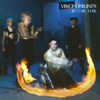Virgin Prunes, "...If I Die, I Die"
 Though it was never recognized as such in its own time, the Virgin Prunes' 1982 debut ...If I Die, I Die truly represented a creative apex of gothic rock. Retrospectively, it's difficult to think of another album that more effectively channeled the decadent perversity, outlandish freakiness and theatrical melodrama that characterized the movement, while avoiding the pitfalls of overwrought self-parody and puerility.
Though it was never recognized as such in its own time, the Virgin Prunes' 1982 debut ...If I Die, I Die truly represented a creative apex of gothic rock. Retrospectively, it's difficult to think of another album that more effectively channeled the decadent perversity, outlandish freakiness and theatrical melodrama that characterized the movement, while avoiding the pitfalls of overwrought self-parody and puerility.
Even other more widely acknowledged classics of gothic post-punk, such as Bauhaus' In the Flat Field, can't match the intensity and single-mindedness of ...If I Die, I Die. The album was produced by Colin Newman of Wire, who seems to have allowed the Prunes' own flamboyant aesthetic to shine through strongly, even while skillfully streamlining their sound and reigning in some of the band's more experimental tendencies. But Newman knew a good thing when he heard it, highlighting the fascinating interplay of the band's three vocalists—Gavin, Guggi and Dave-id—whose menacing voices intertwine and overlap to frequently hair-raising effect. Virgin Prunes' penchant for tribal jackhammer percussion, gloomy bass melodies and spidery guitar figures are in full evidence on the album, and are given a substantial boost by the fine remastering job on this Mute reissue. The packaging has also been given a makeover, with new cover art showing the band in their full costumed glory, and a lyric booklet with further photographic evidence of the Prunes' peculiar style, a combination of glam cover-models and pagan wood-nymphs. The album is loaded with terrifically intense performances to match the band's baroque aesthetic, most notably in the snarling triple-vocal assaults of classics like "Sweethome Under White Clouds" and "Baby Turns Blue." Newman's unorthodox production is positively teeming with atmospheric touches on tracks like "Bau-Dachong," named in the Prunes' invented language of Bo-Prune. Jagged guitar chords and violent drumming propels songs like "Walls of Jericho" into a bleak, claustrophobic atmosphere, even as the singalong chorus pushes the song into poppy territory. Most tracks walk a fine line between dissonance and focus, but occasionally, as on "Caucasian Walk," the band digresses into unhinged chaos. "Ballad of the Man" seemed like the most embarassingly dated of the album's songs, until I realized that it was actually a brutal style-parody of Bruce Springsteen, inverting the Boss' working-class hero mythology to spin a satirical tale about a bank robber. The Prunes' save the weirdest material for the end of the album, with the bizarre "Chance of a Lifetime" and "Yeo," both utilizing reverb and phasing to eerie psychedelic effect, and the latter an inexplicable sequence of vocal intonations and piano melodies being played in a rainstorm. ...If I Die, I Die might not be the most adventurous album of the Virgin Prunes' career, but its certainly the most focused, and a remarkably fierce statement of artistic integrity.



